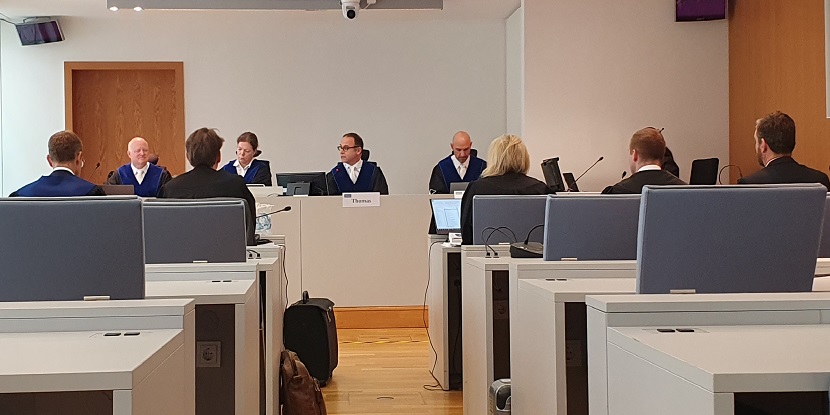Local division Düsseldorf grants first ever injunction against bathtub manufacturer
German bathtub manufacturer Bette faces the UPC's first ever injunction in an infringement case. The company may no longer sell shower trays in seven UPC countries. Germany, the domestic market of plaintiff Kaldewei and high-end competitor Bette, is not affected.
3 July 2024 by Mathieu Klos
Bette may no longer sell certain shower trays in Austria, Belgium, Denmark, France, Italy, Luxemburg and the Netherlands. The local division Düsseldorf issued the ruling today (case ID: ACT_459767/2023). This is the UPC’s first ever infringement judgment.
Germany – the domestic market of the two manufacturers of high-end bathroom accessories – is not affected by the sales ban. Patent holder Kaldewei had excluded the country from its UPC action. In order for the judgment to be effective, Kaldewei would have to enforce it immediately against a security deposit. The amount in dispute is €500,000.
However, there was a moment of shock for Kaldewei at today’s verdict in Düsseldorf, which JUVE Patent attended. Presiding judge Ronny Thomas began his remarks by stating that the court had declared Kaldewei’s EP 3 375 337 invalid in its original version.
Nevertheless, Kaldewei had filed an auxiliary request, which had already saved the patent at the Federal Patent Court. This is now also taking effect at the UPC. EP 337 protects a technology used to fix bathtubs in place. In the extended version, the local division upholds the patent and finds Bette’s products have infringed.
Bette can appeal against the judgment and this is considered certain.
First infringement hearing in Düsseldorf
The Düsseldorf local division heard its first infringement suit on 16 May. It had previously dealt with PI applications from Ortovox against Mammut and from 10x Genomics against Curio Biosciences.
In the infringement hearing, the two German midsized companies Kaldewei and Bette went head-to-head before judges Ronny Thomas, Bérénice Thom, András Kupecz, and technically qualified judge Bernard Ledeboer.
At the oral hearing, Bette did not dispute the infringement and focused on convincing the court presided over by Ronny Thomas that the patent was not valid. Bette had challenged EP 337 with a counterclaim for revocation.

The panel consisting of Ronny Thomas, Bérénice Thom, András Kupecz and Bernard Ledeboer during the hearing on 16 May in Düsseldorf. ©JUVE Patent/Mathieu Klos
They are fierce competitors in the market and had already faced each other before national patent courts. With the help of lead partner Cordula Schumacher from Arnold Ruess and patent attorney Bernd Lorenz from Andrejewski Honke, Kaldewei accused competitor Bette of infringing EP 3 375 337 in seven UPC countries. Krieger Mes partner Jens Künzel represents Bette, with patent attorney Jan Dantz from German IP firm Loesenbeck Specht Dantz.
- Cordula Schumacher
- Jens Künzel
Signal effect for UPC claims
The judgment should be particularly pleasing for patent holders hoping to enforce their patents against competitors at the UPC. It comes as no surprise that a German local divison will issue a far-reaching injunction if the judges consider the patent to be valid and infringed. In such cases German patent judges have always had to issue a far-reaching automatic injunction in national proceedings. The UPC rules give the judges more discretion.
If other UPC divisions then grant such permanent injunctions for all or only some UPC states, this would increase the UPC’s appeal substantially. The next infringement ruling is expected by the end of the week.
On 5 July, the Paris local division under presiding judge Camille Lignières also plans to publish its judgment in the dispute between Dexcom and Abbott. The division heard the first of several lawsuits between the opponents on 25 May (case ID: ACT_546446/2023). The dispute over glucose-monitoring devices has been raging in national courts for some time.
The Munich local division under presiding judge Matthias Zigann will probably announce its first substantial judgment in another case at the end of July.
Revocation judgments still to come
The UPC is also expecting the first two revocation judgments in July. The Munich central division heard its first revocation case on 4 June, concerning the cholesterol-lowering drugs Praluent and Rapatha. Sanofi and Regeneron challenged Amgen’s patent EP 3 666 797. The court heard both the central revocation claim and the counterclaim for revocation, which the Munich local division had referred to the central division (case ID: ACT_459505/2023 and CC_586764/2023). A ruling can be expected on 16 July at the latest.
On 7 June, the UPC’s Paris central division heard its first revocation case in Meril Life Sciences v. Edwards Lifesciences. Judges heard several attacks against Edwards’ EP 3 646 825 (case IDs: ACT_551308/2023, ACT_584916/2023 and ACT_585030/2023). A ruling is expected on 19 July.


